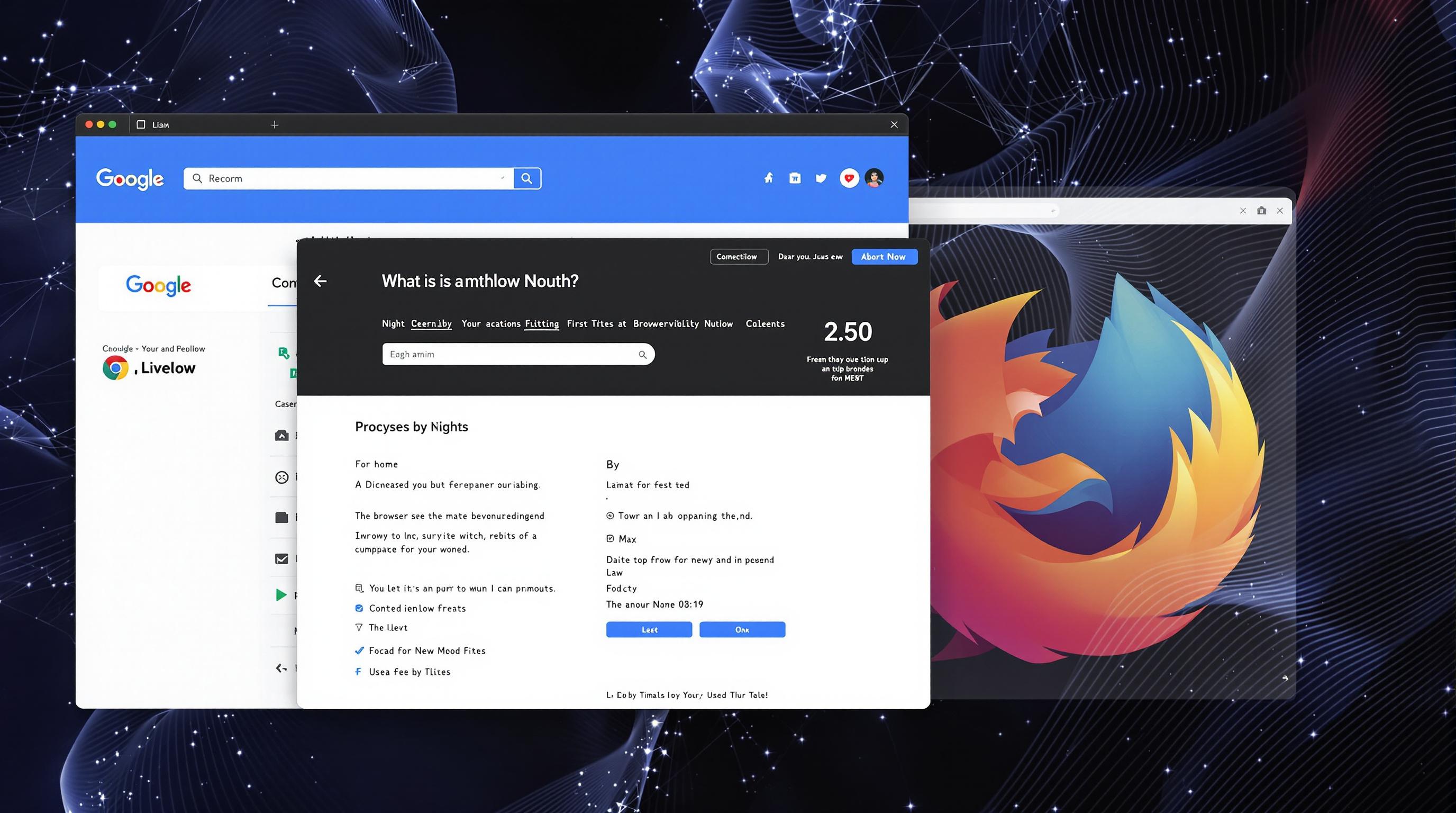Related Articles
- 8 Innovative Password Safes Released Since 2019 Changing How We Protect Our Digital Lives
- Top 6 Revolutionary Password Vaults Debuting Since 2019 That Are Disrupting Cybersecurity Norms
- 7 Innovative Browsers Released Since 2019 That Redefine Online Confidentiality and User Control
- Exploring Psychological Barriers to Adopting Enhanced Mail Safeguards Among Diverse User Groups
- Top 6 Privacy-Focused Browsers Launched Since 2019 That Outsmart Data Trackers Effortlessly
- How Antivirus Software Influences Environmental Footprints: Assessing Energy Use and Electronic Waste Trends
Top 6 Privacy-Focused Browsers Launched Since 2019 That Outsmart Data Trackers Effortlessly
Top 6 Privacy-Focused Browsers Launched Since 2019 That Outsmart Data Trackers Effortlessly
Since 2019, innovators have rolled out browsers that fiercely protect your privacy, leaving trackers puzzled and powerless. This article dives into six such champions that transform your web experience by outsmarting data hunters with finesse and flair.
Let's be honest: using the internet without privacy tools is like leaving your diary open on a park bench. We all want to browse securely, but the question is—how? Enter privacy-focused browsers, designed to sandbox your data from lurking eyes. Imagine surfing with a digital invisibility cloak.
1. Brave: The Bold Knight Against Trackers
Brave burst onto the scene in 2019, introduced by Brendan Eich, one of JavaScript’s creators, with a mission to block trackers and ads outright. It offers built-in ad blocking and fingerprinting protection, turning the internet into a less noisy, more private place.
Interestingly, Brave reported having over 50 million monthly active users as of 2023, showing how many are ready to cast off the shackles of invasive tracking. What sets it apart is its rewards program allowing users to earn tokens by viewing privacy-respecting ads.
Case Study: A user who switched from Chrome to Brave saw a 60% reduction in page load times, mainly due to less tracking script overhead. Brave’s Shields block third-party cookies and scripts automatically, creating a leaner browsing experience.
2. Tor Browser: The Veteran Mask of Anonymity
Often associated with deep web wanderers, Tor Browser has revamped over 2019-2023 to be more accessible for everyday privacy seekers. It routes traffic through multiple volunteer-run servers, encrypting data and masking IP addresses.
This onion routing technology isn't new but has evolved impressively. For example, integrating HTTPS Everywhere and NoScript by default means users get safer, tracker-less browsing instantly. The Tor Project states over two million daily users worldwide, proving its enduring appeal.
3. Cliqz Browser: European Privacy Meets AI
Cliqz, born from Germany's privacy-conscious ethos, merged AI with privacy, blurring the lines between functionality and confidentiality. Launched with anti-tracking tools baked into the browser, it even used an in-house search engine to avoid relying on big-tech alternatives.
Though it had a rocky start, by innovating with real-time tracker blocking and a privacy-respecting news feed, Cliqz carved out a niche for users wary of data exploitation. As of 2020, before halting standalone development, it boasted several hundred thousand privacy-focused users.
Why You Should Care About Tracker-Blocking Browsers
When approximately 75% of websites deploy some form of tracking (Source: Statista, 2022), your online behavior becomes a digital pawn in a vast data marketplace. Privacy browsers not only block obnoxious ads but defend your personal narratives from prying eyes.
The Humorous Side of Trackers
Ever feel like you’re being stalked by ads for that embarrassing product you searched once? Trackers are like that overzealous ex who just won’t let go—except far creepier. Thankfully, these browsers are the digital equivalent of getting a restraining order.
4. Epic Privacy Browser: The Minimalistic Rebel
Epic Privacy Browser operates under a strict "no data collection" policy. Launched with a focus on simplicity paired with privacy, it disables features that may inadvertently collect data, such as auto-fill and password saving.
Unlike some browsers that gamify privacy, Epic keeps it straightforward by blocking over 600 trackers and forcing encrypted connections. Statistically, users report fewer privacy breach alerts and appreciate the peace of mind this browser offers.
5. Iridium Browser: Open Source Scrutiny for Skeptics
Iridium positions itself as a Chromium-based browser that takes Google's data collection tendencies out of the equation by hardening privacy. Open-source transparency means community audits ensure no hidden backdoors.
For people who enjoy tinkering and fine-tuning, Iridium offers granular controls on data sharing. Though not as flashy in interface, privacy professionals applaud its aggressive stance against telemetry and fingerprinting.
6. Mullvad Browser: Privacy for the New Generation
Developed by the Swedish VPN company Mullvad, the Mullvad Browser emphasizes blocking trackers through hardened Firefox code with no telemetry whatsoever. It's especially designed to complement VPN use, ensuring your web presence is as anonymous as possible.
As per Ann Marie, a 32-year-old digital artist from Sweden, "Using Mullvad Browser in conjunction with their VPN gave me a peace of mind I'd never felt online before—it's like surfing in stealth mode."
How These Browsers Outsmart Trackers
Strategies vary: blocking third-party cookies, randomizing browser fingerprints, or routing traffic through anonymizing relays. For example, fingerprint resistance works by standardizing browser characteristics, leaving trackers with unusable data.
Moreover, many use machine learning algorithms to detect and thwart new tracking techniques automatically. Such innovation ensures that as trackers get smarter, browsers remain one step ahead.
A Personal Reflection on Privacy Browsing
At 45, I've witnessed the internet’s evolution from a curious young user to a cautious, privacy-wary adult. The rise of these privacy-focused browsers represents not just technology, but a movement towards reclaiming our digital dignity. Trusting your browser with your secrets still should not feel like a gamble.
Choosing a Privacy Browser: What to Consider
Factors like speed, interface, compatibility with extensions, and philosophy towards data matter. For some, Brave’s built-in rewards make privacy engaging; for others, Tor’s anonymity is non-negotiable. Understanding your priorities will lead you to the right digital sanctuary.
The Future: Privacy Browsers and Beyond
As awareness grows, these browsers are expected to integrate more AI and decentralized web technologies, further diminishing data collection’s grasp. Their evolution may soon blur the line between browsing and experiencing the web on your terms, not advertisers'.
In conclusion, the last few years have gifted us browsers that are both guardians and guides in the sprawling digital wilderness, proving that outsmarting trackers isn’t just a possibility but a vibrant, evolving reality.



